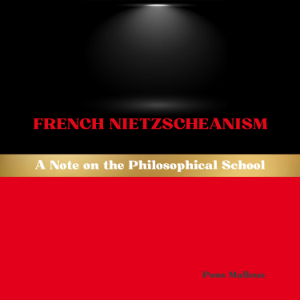

French Nietzscheanism: A Note on the Philosophical School
Pons Malleus
This audiobook is narrated by a digital voice.
The story of French Nietzscheanism is not merely one of philosophical inheritance; it is a tale of reinvention, provocation, and enduring transformation. Emerging in the intellectual crucible of twentieth-century France, this movement represents one of the most creative appropriations of Friedrich Nietzsche’s thought—an appropriation that did not seek to preserve his philosophy as sacred doctrine, but instead treated it as a living force, a weapon of critique, and a source of existential and conceptual liberation.
This audiobook explores the broad and complex terrain of French Nietzscheanism, tracing its influence across the works of Jacques Derrida, Michel Foucault, Gilles Deleuze, and others. It charts the way in which Nietzsche’s ideas—on power, morality, language, subjectivity, and history—were reinterpreted and reassembled in response to the unique philosophical, political, and cultural tensions of twentieth-century France. Nietzsche’s call for the revaluation of values, his suspicion of absolute truths, and his celebration of becoming over being resonated profoundly with French thinkers grappling with the legacies of Hegelianism, Marxism, psychoanalysis, and structuralism.
To speak of a "school" of French Nietzscheanism is both necessary and misleading. Necessary, because there is a discernible trajectory in which Nietzsche’s philosophy serves as a catalyst for a sustained critique of Western metaphysics and humanist subjectivity. Misleading, because the thinkers gathered under this label are marked as much by their differences as by their shared admiration for Nietzsche. Each figure selected his Nietzsche—Dionysian or ascetic, anti-Christian or aesthetic, genealogist or tragic philosopher—to serve his own philosophical project. Yet their divergence is precisely what makes French Nietzscheanism philosophically fertile: it resists dogma, encourages experimentation, and invites us to rethink thought itself.
Duration - 2h 54m.
Author - Pons Malleus.
Narrator - Digital Voice Alistair G.
Published Date - Wednesday, 22 January 2025.
Copyright - © 2025 Pons Malleus ©.
Location:
United States
Networks:
Pons Malleus
Digital Voice Alistair G
Western Philosophical Schools
English Audiobooks
Findaway Audiobooks
Description:
This audiobook is narrated by a digital voice. The story of French Nietzscheanism is not merely one of philosophical inheritance; it is a tale of reinvention, provocation, and enduring transformation. Emerging in the intellectual crucible of twentieth-century France, this movement represents one of the most creative appropriations of Friedrich Nietzsche’s thought—an appropriation that did not seek to preserve his philosophy as sacred doctrine, but instead treated it as a living force, a weapon of critique, and a source of existential and conceptual liberation. This audiobook explores the broad and complex terrain of French Nietzscheanism, tracing its influence across the works of Jacques Derrida, Michel Foucault, Gilles Deleuze, and others. It charts the way in which Nietzsche’s ideas—on power, morality, language, subjectivity, and history—were reinterpreted and reassembled in response to the unique philosophical, political, and cultural tensions of twentieth-century France. Nietzsche’s call for the revaluation of values, his suspicion of absolute truths, and his celebration of becoming over being resonated profoundly with French thinkers grappling with the legacies of Hegelianism, Marxism, psychoanalysis, and structuralism. To speak of a "school" of French Nietzscheanism is both necessary and misleading. Necessary, because there is a discernible trajectory in which Nietzsche’s philosophy serves as a catalyst for a sustained critique of Western metaphysics and humanist subjectivity. Misleading, because the thinkers gathered under this label are marked as much by their differences as by their shared admiration for Nietzsche. Each figure selected his Nietzsche—Dionysian or ascetic, anti-Christian or aesthetic, genealogist or tragic philosopher—to serve his own philosophical project. Yet their divergence is precisely what makes French Nietzscheanism philosophically fertile: it resists dogma, encourages experimentation, and invites us to rethink thought itself. Duration - 2h 54m. Author - Pons Malleus. Narrator - Digital Voice Alistair G. Published Date - Wednesday, 22 January 2025. Copyright - © 2025 Pons Malleus ©.
Language:
English
FRENCH NIETZSCHEANISM
Duration:00:00:10
Introduction to French Nietzscheanism
Duration:00:18:57
Historical Context and Emergence
Duration:00:21:07
Key Principles, Theories, and Ideas
Duration:00:33:02
Nietzsche’s Influence on French Philosophy
Duration:00:16:04
Key Thinkers - Deleuze, Foucault, and Derrida
Duration:00:16:12
Core Debates within the school
Duration:00:17:29
Critiques and Rebuttals in Academic Circles
Duration:00:16:26
Impact on Contemporary Philosophy
Duration:00:16:46
Future Directions for French NietzscheanISM
Duration:00:18:02